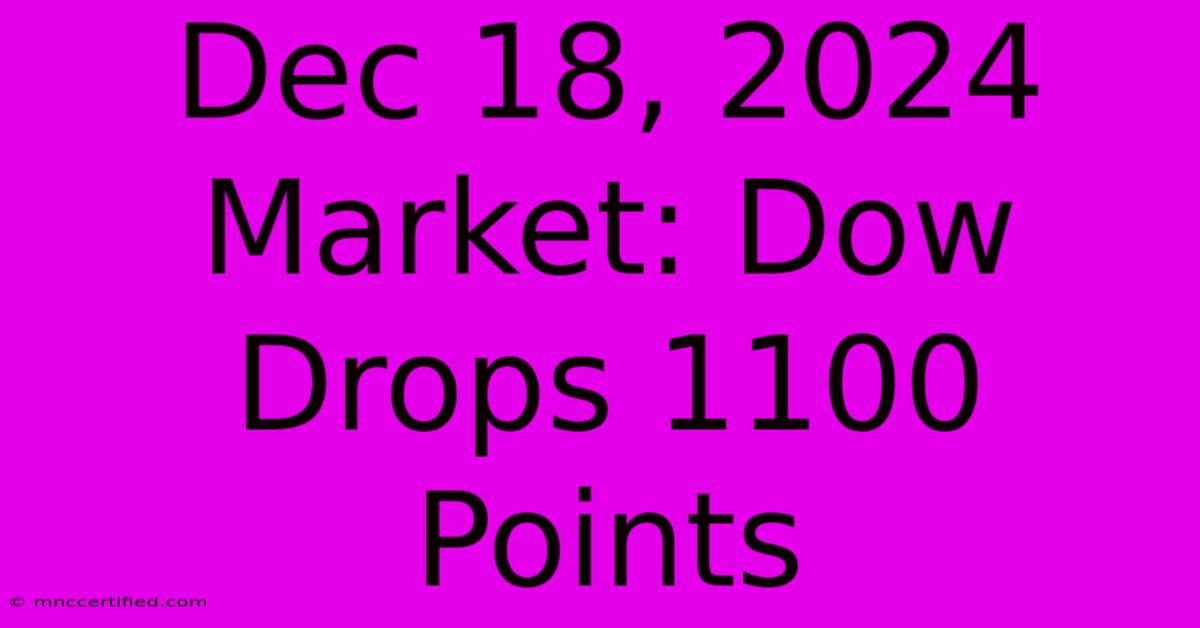Dec 18, 2024 Market: Dow Drops 1100 Points

Table of Contents
Dec 18, 2024 Market Crash: Dow Plunges 1100 Points – Analysis and Implications
A hypothetical scenario exploring a potential market downturn. This article analyzes a hypothetical scenario of a significant market drop on December 18th, 2024, where the Dow Jones Industrial Average falls by 1100 points. This is a fictional event used to illustrate market volatility and potential contributing factors. It is crucial to remember that this is for educational purposes and should not be considered financial advice.
The Hypothetical 1100-Point Dow Drop: What Happened?
Let's imagine a scenario where, on December 18th, 2024, the Dow opens with a significant gap down, quickly losing 1100 points throughout the trading day. This dramatic decline could be triggered by a confluence of factors, potentially including:
Potential Contributing Factors:
- Unexpected Economic Data: A significantly worse-than-expected inflation report, coupled with disappointing employment numbers, could severely shake investor confidence. Negative surprises in key economic indicators often lead to immediate market reactions.
- Geopolitical Instability: Escalation of existing geopolitical tensions, unforeseen international conflicts, or major sanctions could create global market uncertainty, prompting a sell-off.
- Interest Rate Hikes: The Federal Reserve's decision to aggressively raise interest rates to combat inflation could lead to a tighter monetary policy, impacting business investments and slowing economic growth. This, in turn, could negatively affect corporate earnings and market valuations.
- Corporate Earnings Disappointments: A wave of disappointing earnings reports from major corporations could trigger a sell-off, as investors reassess their valuations and future prospects. Negative earnings revisions can drastically impact investor sentiment.
- Algorithmic Trading: Programmed trading algorithms, designed to react to market movements, could amplify a sell-off, leading to a rapid and steep decline. This can create a self-fulfilling prophecy where automated selling exacerbates the initial downturn.
Impact and Implications of the Hypothetical Crash
An 1100-point drop in the Dow would have significant repercussions across the global financial markets.
Immediate Impacts:
- Increased Volatility: We'd expect significantly increased market volatility in the days and weeks following the crash.
- Investor Panic: A drop of this magnitude would likely trigger widespread panic selling, further exacerbating the decline.
- Decreased Consumer Confidence: News of a major market crash could negatively impact consumer confidence, leading to reduced spending and potential economic slowdown.
Long-Term Implications:
- Recessionary Fears: The crash could fuel fears of an impending recession, potentially leading to further market corrections.
- Policy Response: Governments and central banks might implement measures to stabilize the markets and prevent a deeper economic crisis.
- Investment Strategies: Investors would need to reassess their investment strategies and risk tolerance.
Protecting Yourself During Market Volatility
While this scenario is hypothetical, it highlights the importance of preparing for market downturns. Consider these strategies:
- Diversification: A diversified portfolio is crucial to mitigate risk. Don't put all your eggs in one basket.
- Long-Term Investing: A long-term investment strategy helps weather short-term market fluctuations.
- Emergency Fund: Maintaining a sufficient emergency fund provides a financial safety net during periods of economic uncertainty.
- Professional Advice: Consult with a qualified financial advisor to develop a personalized investment strategy.
Disclaimer: This article is for informational purposes only and does not constitute financial advice. The described scenario is hypothetical. Market fluctuations are unpredictable, and past performance is not indicative of future results. Always conduct thorough research and seek professional advice before making any investment decisions.

Thank you for visiting our website wich cover about Dec 18, 2024 Market: Dow Drops 1100 Points. We hope the information provided has been useful to you. Feel free to contact us if you have any questions or need further assistance. See you next time and dont miss to bookmark.
Featured Posts
-
Delevingnes Elton John Christmas Video
Dec 19, 2024
-
Verstappen On Perezs Red Bull Exit
Dec 19, 2024
-
Wiggins Children Face Bullying
Dec 19, 2024
-
Gisele Pelicot Husband Gets Prison
Dec 19, 2024
-
League Cup Arsenal Vs Crystal Palace Final Score
Dec 19, 2024